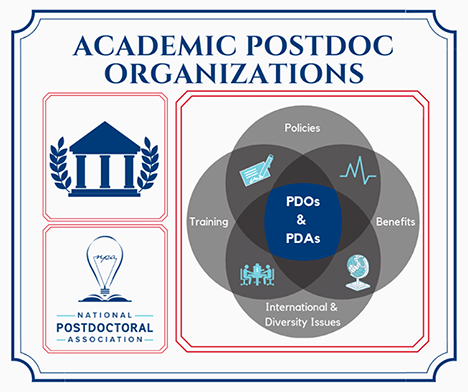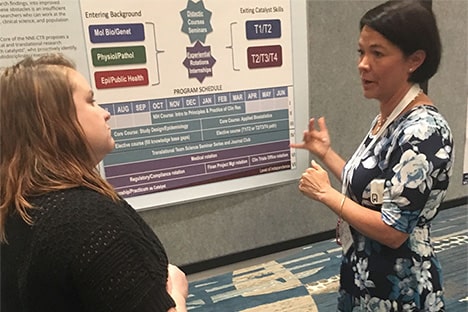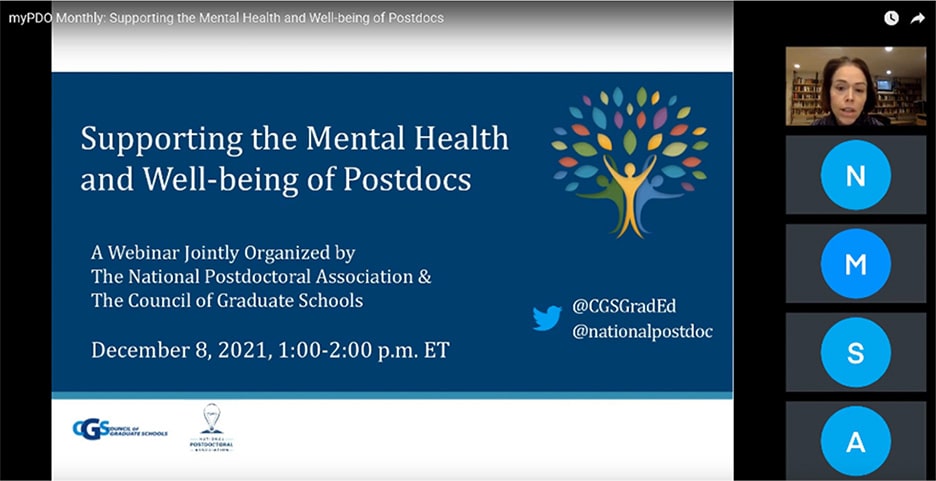Overseas Case: National Postdoctoral Association (USA)
Advocating for Postdoctoral Researchers and Guiding their Professional Growth
Early career researchers, such as postdoctoral researchers, are at a crucial juncture of their careers. Not quite faculty, but not PhD students either—postdoctoral researchers are in a strange gray area. Without proper support and guidance, these researchers may miss out on crucial career opportunities, fail to develop well as researchers, and may even leave academia altogether. Mr. Thomas P. Kimbis, Esq., Executive Director and CEO of the NPA and Ms. Amy Wilson, Office & Marketing Manager of the NPA, are steadfastly devoted to advocating for early career researchers. Their activities at the NPA promote the professional development of early career researchers, especially those from marginalized or disadvantaged backgrounds.
Abstract
The National Postdoctoral Association (NPA) is a non-profit educational organization in the United States that advocates for postdoctoral researchers. With a strong commitment to diversity, equity, and inclusion, the NPA provides recommendations to improve postdoctoral experience and development.
The NPA offers programs that help postdocs gain the essential skills required for their professional development. Their major work involves organizing webinars with experts in the field, publishing guides for postdocs, and conducting an annual postdoctoral conference.
In January 2022, they launched SmartSkills, a year-long course free to NPA members, aimed at helping postdocs obtain skills in improving their lives inside and outside of work. Topics include leadership, communication, and improving wellness and mental health.
The NPA has also launched the NPA IMPACT Fellowship Program to help postdocs from marginalized backgrounds gain access to the resources and opportunities they richly deserve. IMPACT is set to close its first year in April, with 12 postdocs from various disciplines and backgrounds sharing experiences and serving as resources for one another.
Interviewees’ Bio

Mr. Thomas P. Kimbis, Esq. is executive director and chief executive officer (CEO) of the NPA. He has previously led a major trade association, helped multiple offices within the United States government and also overseen a charitable and educational foundation. He was previously an official with the US Department of Energy.

Ms. Amy Wilson is the office & marketing manager at the NPA. Her chief responsibilities include developing marketing strategies to increase the visibility of the NPA as well as daily administrative tasks. She has been affiliated with the NPA for over 10 years.
An overview: Addressing the needs of postdoctoral researchers

The NPA is an organization that works closely with postdoctoral offices and associations to improve the postdoctoral experience (Image courtesy: NPA)
There are many resources out there to help early career researchers plan their careers. However, sometimes young researchers may not be aware of or able to access that information. Sometimes, they do not receive adequate encouragement to pursue that information, especially if they are from an international background or a disadvantaged background.
Back in 2003, when the NPA was founded, there were many institutions that focused on the needs of graduate students and faculty, but no institutions focused specifically on postdoctoral researchers. The NPA stepped up to fill that gap to discuss issues, share information, and advocate on behalf of postdoctoral researchers.
The NPA recently revised its strategic plan to include four pillars. The first is for externally facing advocacy on behalf of postdocs, the second promotes postdoctoral diversity, equity, and inclusion, the third pillar focuses on members and providing them with the tools they need to succeed, and the final pillar is devoted to the NPA internal operational excellence.
The NPA and its work

The NPA is committed to diversity, equity, and inclusion, and is constantly striving to advocate for the needs of postdocs from marginalized backgrounds (Image courtesy: NPA)
The team at the NPA caters primarily to postdocs and the offices at research institutes that support them. Currently, the NPA counts 23,000 postdocs as members, along with 230 research institutions in the United States. Along with the core team, the NPA also consists of many volunteer committees. Volunteers are the backbone of the NPA. The volunteer teams are made up of experts, as well as current postdocs, who are willing to contribute their time to help one another.
In general, the NPA focuses mainly on early career researchers who are looking to broaden their networks outside of their university. This includes postdocs who may be feeling marginalized because they come from international backgrounds or any other background where they feel they may not fit in with their specific university. They also have plenty of members who are looking for career advice and to hone their leadership and ‘smart skills.’
The NPA offers services to postdocs in three main areas. The first is in interactive webinars. Every year, the team polls its members for their needs and then adjusts the types of professional development services they offer.
In their second service area, the team creates written materials and guides to help early career researchers plan their development and update their skills.
The third is the NPA’s Annual Conference, which aims to connect members of the postdoctoral community in the USA with each other.
The status of the activities: Webinars, guides, and conferences

The webinars conducted by the NPA cover a diverse range of subjects that can help a young researcher plan for their future career and development (Image courtesy: NPA)

The IMPACT Fellowship Program is aimed at postdocs from underrepresented minority backgrounds, helping to improve their postdoc experience, provide access to resources, and address the barriers they face during their research (Image courtesy: NPA)

The NPA publishes guides on various themes that enable postdocs to make decisions about their future career and select the path that is best suited to their professional goals (Image courtesy: Shutterstock)
The team at the NPA offers a number of activities in its three service areas throughout the year. It regularly conducts webinars on a variety of themes that are relevant to postdocs with the aim of furthering their professional and personal growth and development.
In 2022, the NPA launched its SmartSkills course. It is a free training program for their members, where every month a different expert will teach a virtual webinar to help members pick up skills like leadership and public speaking. These webinars will also aim to teach early career researchers how to handle their mental health and wellness. As of March 2022, SmartSkills has over 600 registrants, making it the largest program in the history of the NPA.
The NPA also has a program called the IMPACT Fellowship for people from underrepresented minority backgrounds. The IMPACT Fellowship Program allows the NPA to get some more facetime with individual postdocs and get to know the challenges they face. The NPA is always seeking sponsors of this novel program who want to help increase diversity and equity in the postdoctoral space, including universities, research institutions, philanthropic entities, and corporations.
As a part of its services, the NPA also publishes guides and toolkits on various themes that enable postdocs to make decisions about their future career and select the path that is best suited to their professional goals. Many of the guides developed by the NPA are created based on the needs of the researchers at that time. For example, they have helped many institutions create their own Postdoc Office and Postdoc Association. Sometimes the guides are developed based on grants, such as the recent guide on maternity and paternity leave that was written as part of an advanced grant with the National Science Foundation.
One of the most important guides developed by the NPA focuses on creating an individual development plan (IDP). Early career researchers need a concrete plan for their professional development. More often than not, this plan materializes in the form of an IDP. IDPs are essential tools for postdocs that allow them to develop a future plan in line with their career interests. An IDP allows an early career researcher to understand and assess their career journey, without having to rely only on their principal investigator (PI) or mentor. It provides young researchers with a plan of action on how to grow, not only in the lab or workspace, but in professional spaces outside these as well. In the coming year, Ms. Wilson of the NPA will be leading the process of refreshing the guides and relaunching the website.
The NPA Annual Conference is also a major focus of the NPA’s activities. It helps postdocs connect with each other. In 2021, the conference was held for the first time on a virtual platform, which helped the NPA double the number of attendees. In 2022, the NPA is hoping to offer a hybrid structure for their annual conference with an event in person in Chicago from April 1–2 and some events online through the NPA Virtual Conference from April 28–29, accessible worldwide. This is in line with their mission of equity, opening up the conference to attendees who might not have the resources to travel to the conference. This includes international attendees, as well as attendees in the USA. The NPA is also looking at other ways to combat postdoc isolation.
A key mission of the NPA is to address the needs of marginalized and disadvantaged researchers. There are many deficits in academia in terms of diversity, equity, and inclusion. The NPA has made some exciting strides to support women in science, technology, engineering and mathematics (STEM) and social, behavioral and economic sciences (SBE). The NPA also held their first Gender Equity Summit in 2021, where many different organizations participated to present materials to people of all genders—including researchers outside the gender binary. The Gender Equity Summit also allowed the NPA to converse with a group of researchers from diverse positions on the gender spectrum and better understand the barriers they face to accessing the resources they need for development.
Further to the goal of gender equity, the team received a grant for the Elsevier Advancing Postdoc Women Clearinghouse, which has made it easier for their members to access guides online. Publications by the NPA are now listed in the online Clearinghouse, which lists different resources from associations and professional societies.
The stellar reputation of the NPA
The NPA’s recommendations and guidelines for postdoctoral careers have been adopted by over 160 premier research institutions.
These guides and toolkits are often referenced by the NPA’s partner organizations. The partner organizations also direct early career researchers towards the resources offered by the NPA.
The IMPACT Fellowship Program has also received very strong participation from the community. It has been a huge success. The NPA plans to develop the program and increase its capacity in 2022.
Finally, the large volunteer workforce at the NPA is testament to the good work it does.
The effectiveness of the NPA’s services: How do we measure the impact of something that is constantly changing?
On the whole, the NPA is focused on current postdoctoral researchers. Their members are always changing as new people enter into postdoctoral fellowships and older members move onto fresh roles. Due to the constant and growing needs of current postdoctoral researchers, the resources of the NPA are devoted towards addressing the needs of their current members and ensuring that they are prepared for their future careers. In fact, the effectiveness of the work done by the NPA can be evidenced by its growing membership. The bulk of the membership of the NPA comes from academic institutions, who recommend the organization to their researchers.
Another way to measure the success of the NPA’s mission is to look at the grants it has received. The NPA has received many grants, including grants from the National Science Foundation. The NPA has also partnered with corporate organizations who believe in their mission and are interested in the success of postdocs.
Prospects for the future: Making sure members are best prepared for their future
The life of an early career researcher is not easy. There are many hard decisions for them to make, such as whether they should continue in academia or if they should seek out a job in industry. The most important thing for young researchers to remember is to follow their passion and be open to new mentors.
Sometimes, postdocs get into one area due to external pressures or family desires. Sometimes they have not really thought about what they need out of life or what they want to do. Growing as a researcher is very difficult if one is not following one’s passion.
The second most important thing to remember is to be open to new mentors. Mentors can make or break a young researcher’s career based on the advice they give. The NPA is trying to increase the number of good mentors out there with their work.
Finally, it is very easy to become overly focused on work. Researchers should carve time out for themselves to develop professionally and personally outside their institution. It is very important for them to put these parameters down as quickly as they can with the help of their university or PI.
Another thing for both young researchers and institutions to keep in mind is that PIs are not always convinced of the importance of professional development. It is imperative to ensure that both the university and PIs really understand the need for researcher development projects. Professional development is a part of the postdoc role and should be formally incorporated into it. Educating PIs on the importance of this is crucial. They also sometimes need to be reminded that having lab members who have participated in researcher development activities is ultimately helpful to them.
As a final word of advice, the NPA believes that young researchers should figure out what resources the university already offers and try to gather them together. Also, they should find out what obstacles there are to accessing these resources. Finally, they should try to communicate with other young researchers to share information on these resources and spread awareness so that they can help each other out.
To learn more about the NPA, visit www.nationalpostdoc.org or email contact[at]nationalpostdoc.org (please change [at] to @).
Interview date: December 2021
Interview cooperation: Cactus Communications
